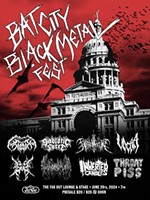Haunting the Chapel
Q&A with Dave Lombardo of FFFF headliners Slayer
By Raoul Hernandez, 5:07PM, Wed. Nov. 2, 2011
In addition to anchoring Fun Fun Fun Fest’s biggest headliner yet in the Slayer drum seat on Sunday, Dave Lombardo's power trio Philm plays a free, free, free show Thursday at Emo's East with local openers My Education and Unmothered. We spoke last week.
Austin Chronicle: It feels like last year’s World Painted Blood took Slayer to another level.
Dave Lombardo: Ummm [long pause], it was a strong album and it was liked by a lot of fellow musician friends. Everybody praised the album and really enjoyed it, including Metallica. They liked it a lot. Of course we were working with the same producer. I don’t know. It might have. It seems like it.
AC: I touched on this last year with Tom Araya, but it feels like the times have caught up to Slayer. You’re accepted as part of the mainstream culture where once the band was fringe at best, reviled at worst. World Painted Blood felt like another step up into that.
DL: Yeah. It's society. They started accepting things. I mean, I Dream of Jeanie [1965-1970] couldn’t show her bellybutton on TV, but now we have butt cheeks all over the place. Times change and people start realizing we’re not these people that are out for blood and out to destroy humanity or society. We’re just musicians and artists. And the people that were listening when they were 19, 20, 25, they have kids now. There are things that scare them more than just a band and their music. Times have changed.
AC: Again, I touched on this with Tom, but as much as everyone liked Christ Illusion before it, when World Painted Blood came out, it was hailed as a Slayer classic. Did you have that sense?
DL: I had that sense before we even stepped foot in the studio. If you look back on interviews I was saying this album was going to be amazing when vocals weren’t even recorded. Because I listened to the way the music flows. If the music flows in a correct manner, if it feels good to me, chances are that the song’s going to be a good piece. That’s just me personally, my own opinion. But I also think it’s the help of the producer we worked with [Greg Fidelman] that brought out the best in this band. Maybe it was also the nature of the recording process. Usually, when we go into the studio, the songs are done. This time, we went in there with only half the music done, and we had to write the rest in the studio. So it put us in a little different position than before. Who knows?
AC: Obviously there’s been a lot of bands that went into the studio with only half an album written and it didn’t turn out half as well for them. For y’all it seems to have changed the game up just enough to give it an edge.
DL: It did. It did. The outcome of this record, for me… the sound, the drum sound was great. Guitars, the vocals – the way the vocals sit with the music. Melodies, everything. I was really, really proud of that album. And the band.
AC: You mentioned Metallica earlier. The Big Four shows – Metallica, Slayer, Megadeth, and Anthrax – must have been important promotion for World Painted Blood.
DL: For the album and the band. That took us to a whole different place, the recognition Metallica gave us. And Megadeth and Anthrax. That helps all of us. All those people we played in front of that were only into Metallica were now force fed a Slayer live show. They had to wait for Metallica, so those people that had never seen Slayer – were scared to go see Slayer – they got to see us. I’m sure we changed a lot of people’s minds and opinions of us with those shows. It was very helpful to have us on this tour.
AC: That’s so alien to me – someone into Metallica not being into Slayer. It’s like the Beatles and the Stones: you may fall into one camp but you’re still generally a fan of the other band.
DL: Yeah, hmmm. I’ve spoken to some Metallica fans. They’re pretty hardcore when it comes to who they like and who they don’t like. They’ll say, “You guys are okay, but I like Metallica.” That’s why I said we force fed them Slayer at a Metallica show. I think we won over a few fans.
AC: When I saw Slayer in Houston last year, you played South of Heaven in its entirety, which sounded great, but you only played a couple World Painted Blood songs. That was disappointing. Did the album get vetted live?
DL: We were playing just a handful of songs, probably not as many as I would have liked. Like I said, I love this album. Because were playing the whole South of Heaven album we couldn’t really dive into the World Painted Blood record. I really don’t know why we had to do that during that time. These promoter requests, or agent requests, they usually have us do one of those albums in its entirety, whether it’s Reign in Blood, South, or Seasons [in the Abyss].
AC: Is Jeff Hanneman playing with the band again?
DL: He’s been rehearsing with us. He’s doing better, but he still has to go through a lot of rehabilitation. He needs to work on his arm more. But he was practicing with us. There’s still a good possibility he may be at the show. We’re giving Jeff as much chance as possible to work the bugs out.
AC: He could be at the Austin show?
DL: He could be yes.
AC: When Slayer’s in town here, so’s your band Philm – Thursday, Nov. 3 at Emo’s East.
DL: Yes! I’m very excited about that.
AC: Tell me about the band.
DL: It’s a power trio. It’s very much reminiscent of the bands of the late Sixties, which I’m a big fan of. And I play a little four-piece drum set instead of the big Slayer double bass kit that I’m known for. We have a bunch of originals, which we’re recording at the moment. Hoping to do more shows and get this album finished and released. Another album on my shelf.
AC: Philm’s two years old?
DL: It’s a long, rocky story with this band. I’ve known Gerry [Nestler], the guitar player, since ’95, so we’ve had this band off and on since then. Now, with my recent divorce, I’m able to focus on various other projects and this was one of them. This was one I pulled out of the archives and said, “You know what? This is one I want to work with now.” Like I said, we’ve had some of these songs since ’95, and now we have a new bass player. His name is Pancho Tomaselli. He plays in the band War. The one with “Low Rider.” It’s an amazing trio. I highly recommend people to check it out, because they won’t be disappointed. We just got back from Poland. We killed it there. It was great.
AC: My girlfriend and I just got back from Poland!
DL: I got back the night before last. We were in Wrocław, the Western part of Poland, near Berlin and the German border, and Opole, another city nearby. Great. It was awesome.
AC: We loved Poland and the Polish people.
DL: Absolutely. Warm people, great cooks. Great drink. It was phenomenal. They treated us like royalty there and we really appreciated it.
AC: I need a drum lesson. I’m a huge metal fan my whole life, but I have no idea what a blast beat is. What is a blast beat?
DL: Ummm. Man, it’s hard to explain for a musician that was self taught. I could give you the details but it probably wouldn’t make any sense. They’re eighth notes on the snare – eighth notes on your right hand, doing cymbals – the same eighth note. Then your bass drums are doing… quarter notes on each foot? So you’re alternating bass drum hits. The bass drum hits are going, “Bop, bop, bop, bop, bop, bop, bop,” and then the snare is going, “Dah, dah, dah, dah, dah, dah, dah.” And then you speed it up, so you have this, “Dahdahdahdahdahdahdah.” So that’s a blast beat. If it makes any sense.
AC: It did! I totally got that. Who’s credited with inventing it? Is that a black metal thing?
DL: It’s definitely post Slayer. I don’t know who that first person was that did that beat. I don’t know who that was. But then I started using it in Fantomas, when I was working with Mike Patton. So we implemented that beat into a lot of his songs. Then after that, I recorded the Philm record and I added blast beats to that as well. One song on Christ Illusion and one on World Painted Blood, “Public Display of Dismemberment.”
AC: You’ve been referred to as “The Godfather of Double Bass.” Is that accurate and if so please explain it for the layman, me.
DL: [Laughs] It is [accurate] in that some magazine titled me that. On the cover of some UK magazine, they said I was the godfather of double bass [drums]. So far, nobody’s argued with that. When they say online, “Oh, he’s a pioneer,” then it’s like, “No way, you can’t say he’s a ‘pioneer.’” So nobody’s argued with it, and I’m okay with it.
AC: And double bass simply means both feet are on the kick drums.
DL: Correct. And your snare hand is probably going about 210 beats per minute, followed by the bass drum. Pretty insane.
AC: So if you’re the godfather of that, it wasn’t common before you, correct?
DL: Not at that speed – not at that speed. Or that ferocity. Not at that level. Other guys, [jazz great] Louis Bellson has played double bass. [Cream’s] Ginger Baker played a little bit of double bass. Mitch Mitchell [of the Jimi Hendrix Experience] I think did as well, but you can’t hear it on the record. Those guys played a lot of that, but I guess I just took it to a different level in those early years.
AC: As someone who was self-taught, when did that make it into your game?
DL: Ummm, probably by Haunting the Chapel, which was our second release. Because the first album was done without double bass, then the second one, Haunting the Chapel, which was the EP, that one we recorded with double bass. There was “Captor of Sin” and “Haunting the Chapel.” Those were the two songs, so what, it goes back to ’84? Playing at that speed back in 1984, with no computers – on tape – is the beauty of it.
I like to look back at it, because these days a lot of drummers are claiming, [assumes a Scandinavian/ German accent], “He’s 200 beats per minute, this, that.” “Two-hundred-fifty: He’s the fastest!” It’s like, “You know, guys, ‘Humanly possible?’” At least for me, between 210 and 215 beats per minute – that. I might have gone faster in a live environment, with adrenaline and everything, but that’s pretty much it humanly possible – I think.
AC: You and I are born the same year, 1965. How do you feel physically as you approach 50, in terms of drums?
DL: [Let’s out a sigh] I really hope this lasts because I feel amazing. My joints, my bones, my muscles – I feel better now than I did probably 20 years ago. I was abusing my body 20 years ago, you know, drinking and doing the excess. Now, I’m eating better, I take my vitamins every day, I try to do pushups every day, I do my walking. You just try to stay in shape. You try to hold on to this body that you’re given for a while and at least try to make the best of it.
AC: I marvel at drummers playing two-hour shows and especially in such an aggressive genre as metal. I wonder about the athletic experience involved in that you’re sweating, breathing – antihistamines. Is it that you get second and third winds, or you don’t really realize 90 minutes have passed? What happens to you in a show with such tremendous physical activity?
DL: Well, there is definitely a lot of euphoria happening at different sections of the set. Yeah, you’re tired, but then there’s a part of the song that kicks in where it just kicks your ass, and you’re like, “Yeah! This feels good.” And the excitement level goes up. There’s times when I’m doing rolls, these drums rolls, and I’m lost in this whirlwind of music. I lose my consciousness almost. Not to faint. I’m so in the music that I get into the zone that I don’t know where I go. All I know is that the song ends and I wake up going, “Whoa! What the hell was that?
My drum tech, who’s been working with me forever, he knows when I get in there. He knows when I’m in that zone. It’s something about the playing, the performance. I think it’s adrenaline. I can’t describe it. It’s euphoric and it’s unconscious. I almost have this weird… It’s not an out-of-body experience. It’s like I’m not in my body, but… It’s strange, kinda weird.
You have people that are in these accidents. And you’ve heard of them doing these super-human things to save their loved ones. Adrenalin kicks in. And then you ask them later, “How did you do it? What did you do?” They’re like, “I don’t know! I don’t know what I did.” They just did what needed to be done.
A note to readers: Bold and uncensored, The Austin Chronicle has been Austin’s independent news source for over 40 years, expressing the community’s political and environmental concerns and supporting its active cultural scene. Now more than ever, we need your support to continue supplying Austin with independent, free press. If real news is important to you, please consider making a donation of $5, $10 or whatever you can afford, to help keep our journalism on stands.
June 28, 2024
June 14, 2024
Slayer's Dave Lombardo, Slayer, Dave Hanneman, Metallica, Megadeth, Anthrax, Philm









